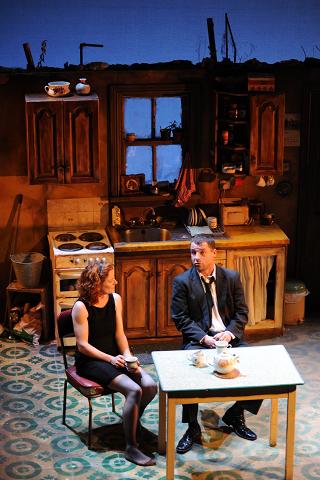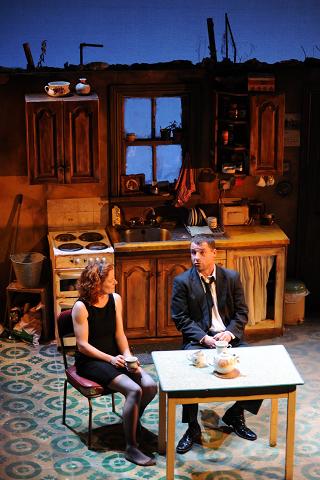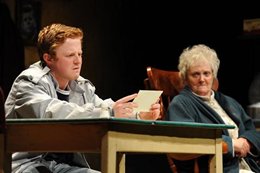One of the great achievements of Martin McDonagh’s 'Leenane Trilogy' is the mixture of consciously caricatured, stylised and silly stage-Irishness in the language and much of the behaviour and references, which is contrasted with its diametric opposite, that of a murderously brutal and cruel underbelly. Thus it is that any successful production of The Beauty Queen of Leenane must first of all seduce audiences into a false sense of complacency with its Father Ted-like lightness only to sucker punch them with the inevitable horror that is ultimately unleashed. Happily, for the most part, the Theatre Royal’s very fine new production of the first play in the Leenane trilogy carries this dual mission off, even if it doesn’t quite catch the darkness and bleakness of the original 1996 Druid production.


Those who are not familiar with the play should know that The Beauty Queen of Leenane tells the story of Maureen Folan (Jenni Ledwell), a fine looking 40 year-old-woman, still single and taking care of her elderly mother, Mag (Gillian Hanna). Maureen has one chance to escape from Leenane and her mother via the not altogether perfect love of Pato Dooley (Michael Power), a sensitive, understanding young man who has emigrated to London where he works on the building sites but who returns intermittently as occasions in Leenane demand. Pato often has recourse to his comical, ineffectual younger brother Ray (Conor MacNeill) to relay his messages and letters from London to his people in Leenane, especially Maureen.
It quickly becomes apparent that the relationship between Maureen and Mag is not the expected loving and caring one but one full of real hate, bitterness and desperation. Interlacing and surrounding the relationship between mother and trapped daughter are all those familiar Irish themes of sexual and emotional paralysis, suffocating authority and an equally frustrating limitation imposed on intellectual and global horizons. The beauty of McDonagh’s writing is that he dresses up, even disguises, these explorations in the most ridiculous Hiberno-English phrases.
Michael Power delivers an extremely touching performance as Pato. He manages to convincingly distil his character’s genuine gentleness and sympathetic nature in the midst of all the surreal humour and overwhelming bilious hopelessness that exists between Maureen and Mag – a despair, incidentally, which the character of Ray is also infected with. As a director, Ben Barnes has always been at his best when teasing out the subtle and delicate nuances that exist in human relationships. Barnes’ astute and perspicacious direction comes most to the fore in the tete-a-tetes between Pato and Maureen.
 It’s a mite unfair yet inevitable that the performances in this production will be compared to those of the Tony Award-winning one of Druid, especially since the memory of Anna Manahan is invoked in the programme by the Waterford-based Theatre Royal. As Mag in the original show, Manahan gave a career-defining performance and delivered such an all-encompassing portrait of desperate amorality that all future performers of the role will find extremely difficult to surpass. Here, Gillian Hanna tends to go for a slightly more cartoon-like expression of Mag. It’s not an inappropriate strategy as there is a good deal of the grotesquery of the cartoon in McDonagh’s writing. However, it takes away ever so slightly from the human horror of what transpires. It further lessens the intensity of the interplay between Mag and Maureen. Meanwhile, Conor MacNeill’s Ray never really displays the vulnerability Tom Murphy brought to the role again in the original Druid production.
It’s a mite unfair yet inevitable that the performances in this production will be compared to those of the Tony Award-winning one of Druid, especially since the memory of Anna Manahan is invoked in the programme by the Waterford-based Theatre Royal. As Mag in the original show, Manahan gave a career-defining performance and delivered such an all-encompassing portrait of desperate amorality that all future performers of the role will find extremely difficult to surpass. Here, Gillian Hanna tends to go for a slightly more cartoon-like expression of Mag. It’s not an inappropriate strategy as there is a good deal of the grotesquery of the cartoon in McDonagh’s writing. However, it takes away ever so slightly from the human horror of what transpires. It further lessens the intensity of the interplay between Mag and Maureen. Meanwhile, Conor MacNeill’s Ray never really displays the vulnerability Tom Murphy brought to the role again in the original Druid production.
It might have been more interesting, too, if lighting designer Thomas Hase had lit the stage in a less glaringly bright manner and gone instead for what would have been a more realistic dimmer shade, given that the scene of the entire play is the one simple kitchen. The set design appropriately presented iconic details on the walls such as the framed photos of JFK and Pope John Paul II but, again, a grimier mise-en-scène might have conveyed the darkness of the themes more.
Having said all that, the Theatre Royal’s production still shows a deep understanding of both the humour and the tragedy at the centre of The Beauty Queen of Leenane. In spite of its flaws it has enough power to impress on a new generation of theatre goers the deep hypocrisy with which we still assess ourselves in this country. The Beauty Queen of Leenane remains evidence that the scars of church and colonialism still fester and our attempts to cleanse ourselves of these wounds is ongoing.
Patrick Brennan was chief theatre critic and arts writer with the Irish Examiner from 1990-2004. He is a journalist and critic and is currently writing a book on the theatre of Tom Murphy.